Coconut Oil For Psoriasis: How Does It Work?
A deep insight into the workings of this nourishing oil on this skin condition.

Image: shutterstock
Psoriasis is a chronic skin disease that causes scaly, itchy, sometimes red patches on the skin. Although there is no known cure for this skin disease, numerous treatments are available. Coconut oil for psoriasis is one of the most common remedies.
Coconut oil can hydrate the skin and, as a result, it is considered capable of treating the skin dryness associated with skin conditions, such as psoriasis, eczema and dermatitis. However, there is not much evidence to back up this claim.
Still, many skin specialists advise using coconut oil to treat psoriasis symptoms. So, is it worth a shot? Read on to learn everything there is to know about this treatment!
In This Article
Coconut Oil And Psoriasis

Coconut oil exhibits excellent moisturizing abilities and is a plausible treatment for dry skin (1). Hence, it is highly recommended for psoriasis treatment. The use of coconut oil for psoriasis may not be limited to the skin on the face or body. It can also be used for psoriatic scalp treatment. You can apply it on the scalp to loosen the scales and relieve the itching.
Coconut oil shows anti-inflammatory action. It also shows better positive effects on the skin barrier when compared to other plant oils. It even possesses anti-bacterial and antioxidant properties that help treat skin conditions (2).
Treating psoriasis with coconut oil may offer some relief. However, such natural remedies should not replace the first line of treatment suggested by a medical professional. Due to lack of sufficient evidence, the use of coconut oil to treat psoriasis remains only a natural remedy. It may be used alongside primary lines of treatment, but not exclusively as a standalone remedy.
A blogger, tried coconut oil for psoriasis and shared her experience in a blog post. She says, “I do not put any ointment on it, I just try to go about my day with a normal moisturiser and in the night, I will cleanse my skin with pure Coconut Oil (comes hard, so needs to be left to melt in your hand into an oil) and then I will apply some more onto the flakier parts of my face. This has been a recent discovery of mine and so far it is going really well, it has left my skin really soft, no flakes and so far (i).”
 Quick Tip
Quick TipThat said, is coconut oil safe to be used to treat psoriasis symptoms? Or does it cause any side effects?
Key Takeaways
- Coconut oil is a natural symptoms of psoriasis.
- Seek medical help if you witness redness or irritation upon applying coconut oil to treat psoriasis. It can be an allergic reaction.
- Virgin coconut oil is safe and preferable to treat psoriasis.
Potential Side Effects

The only time the use of coconut oil for treating psoriasis may cause any side effects is when you are allergic to it. You could be allergic to the oil if you notice any skin redness or irritation after applying coconut oil. Immediately wipe the oil off your skin and seek medical advice.
But coconut oil, in most cases, is safe, commonly used for a variety of purposes, and may help relieve the discomfort of psoriasis.
How Does Coconut Oil Work On Scales And Patches?
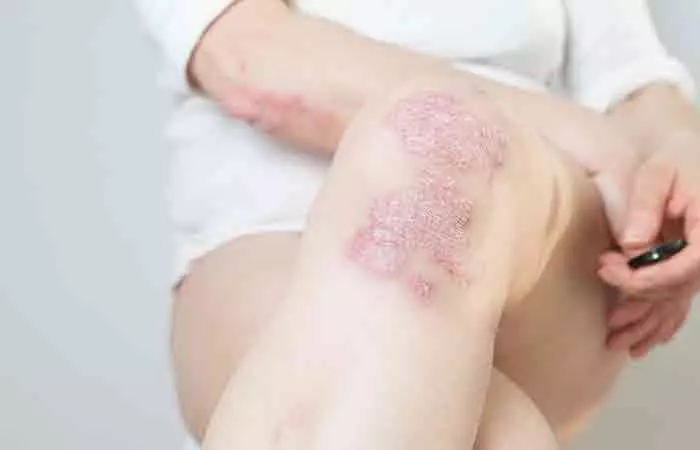
The moisturizing, anti-inflammatory, and antibacterial properties of coconut oil may help treat psoriasis scales and patches. It also may help reduce skin redness and swelling. It might work by softening and smoothening the rough, dry skin. Though it may not be completely effective by itself, it may help increase the effectiveness of other psoriasis treatments.
If you intend to use coconut oil for psoriasis of the scalp, the following section may help.
Tips For Treating Scalp Psoriasis With Coconut Oil

Scalp psoriasis could be harder to treat. Since it may get trapped under the hair growth, it can build up to become tougher. This is how you can use coconut oil for scalp psoriasis:
- Focusing on the scaly areas of the scalp. Spread the oil evenly over the affected areas.
- Use your fingertips to gently massage the oil into the scalp.
- Let the oil stay on the scalp for at least 60 minutes or overnight. Cover your head with a towel or a shower cap.
- Wash your oiled hair with a gentle, sulfate-free shampoo later.
After shampooing, gently comb your hair with a plastic comb while your scalp and hair are still damp. Some believe this can loosen up the scales and make them leave their grip over the scalp. You may comb them out without tugging too hard. However, consult your doctor regarding the same.
What Type Of Coconut Oil Is Good For Psoriasis?

Virgin coconut oil is preferable to treat psoriasis symptoms. It is obtained through the cold-pressed extraction method without the application of heat. It is much safer than other forms of coconut oil.
 Quick Tip
Quick TipThe oil is generally safe. But stop using it if you experience any allergies. If not, ensure you go for virgin coconut oil and use it regularly for better results.
Infographic: Top 5 Benefits Of Using Coconut Oil For Psoriasis
Coconut oil has gained popularity worldwide for treating various skin conditions. It has moisturizing properties that help tackle the skin dryness associated with psoriasis. We have listed the top benefits of using this natural oil for psoriasis in the infographic below. Scroll down to know more!

Illustration: StyleCraze Design Team
Psoriasis does not have a cure. All you can do is control the symptoms with home remedies or medical treatments. Applying coconut oil for psoriasis is one such remedy. Coconut oil’s antibacterial, antioxidant, and inflammation reducing properties may help treat several types of dermatitis. While more studies are warranted to claim the efficiency of coconut oil in treating psoriasis, you may apply it as a natural remedy along with the medical treatment. However, avoid using it if you are allergic to coconut oil, as it will worsen your skin condition.
Frequently Asked Questions
Can coconut oil be used with psoriasis medications?
Yes, coconut oil can complement prescribed treatments by soothing symptoms. However, it’s important to consult your doctor first to ensure it won’t interfere with your medications.
Does psoriasis spread if you scratch it?
No. Scratching a psoriasis rash won’t cause it to spread. However, it can worsen this skin condition.
Is Vaseline good for psoriasis?
Dry skin makes the itchiness worse. But using Vaseline helps with this condition. However, using it for psoriasis during the summer can worsen the condition.
Does psoriasis worsen with age?
No. Psoriasis may get better or worse depending on many environmental factors. But it does not get worse with age.
Which vitamins help with psoriasis?
Vitamin A, vitamin B (biotin and B 12), vitamin C, and vitamin D may help improve the symptoms of psoriasis. So, it is a good idea to add foods containing these vitamins to your psoriasis diet.
Where does psoriasis usually start?
Psoriasis patches may first appear on the lower back, knees, elbows, and scalp.
Should I cover my psoriasis at night?
Yes. Apply any nighttime moisturizer (select the greasier or thicker one) to the patches and wear any cotton sleepwear (this fabric won’t irritate your skin) to cover psoriasis at night.
Can Covid trigger psoriasis?
One case of an acute guttate flare of chronic psoriasis was reported in one person with Covid (3). However, more information is warranted in this regard.
Is salt water good for psoriasis?
Salt water improves psoriasis as it removes dead skin cells from the skin.
Illustration: Does Coconut Oil Help With Psoriasis? How Does It Work?
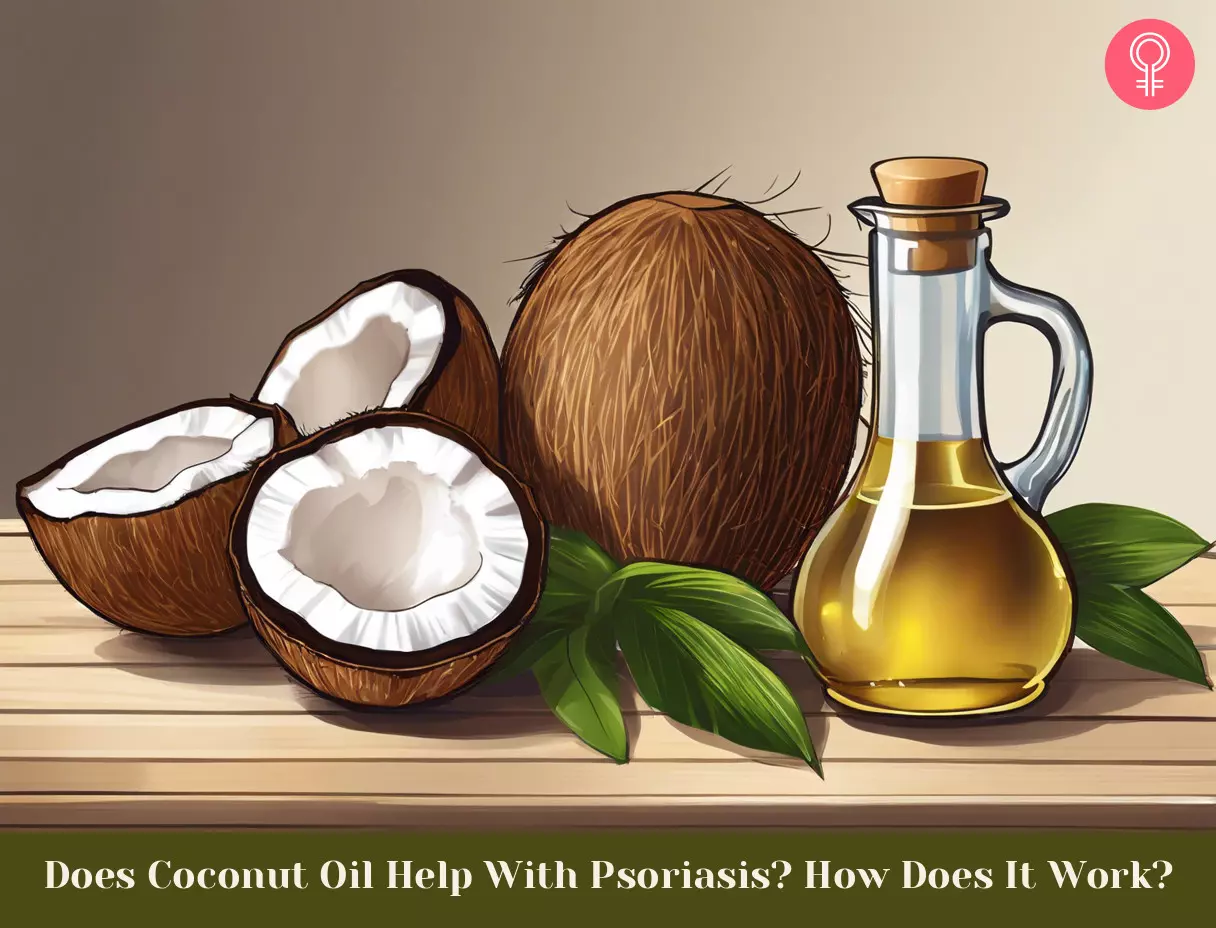
Image: Stable Diffusion/StyleCraze Design Team
Coconut oil has been used to treat psoriasis for centuries. Learn how it can help reduce symptoms and improve skin health from this informative video.
Personal Experience: Source
StyleCraze's articles are interwoven with authentic personal narratives that provide depth and resonance to our content. Below are the sources of the personal accounts referenced in this article.
(i). My Update Life With Psoriasis
https://nuggetstumpblog.wordpress.com/2017/04/17/my-updated-life-with-psoriasis/
References
Articles on StyleCraze are backed by verified information from peer-reviewed and academic research papers, reputed organizations, research institutions, and medical associations to ensure accuracy and relevance. Read our editorial policy to learn more.
- In vitro anti-inflammatory and skin protective properties of Virgin coconut oil:
https://www.ncbi.nlm.nih.gov/pmc/articles/PMC6335493/ - Anti-Inflammatory and Skin Barrier Repair Effects of Topical Application of Some Plant Oils:
https://www.ncbi.nlm.nih.gov/pmc/articles/PMC5796020/ - Guttate psoriasis secondary to COVID-19
https://casereports.bmj.com/content/13/8/e237367
Read full bio of Dr. Schwarzburg
Read full bio of Arshiya Syeda
Read full bio of Ramona Sinha
Read full bio of Medha Deb






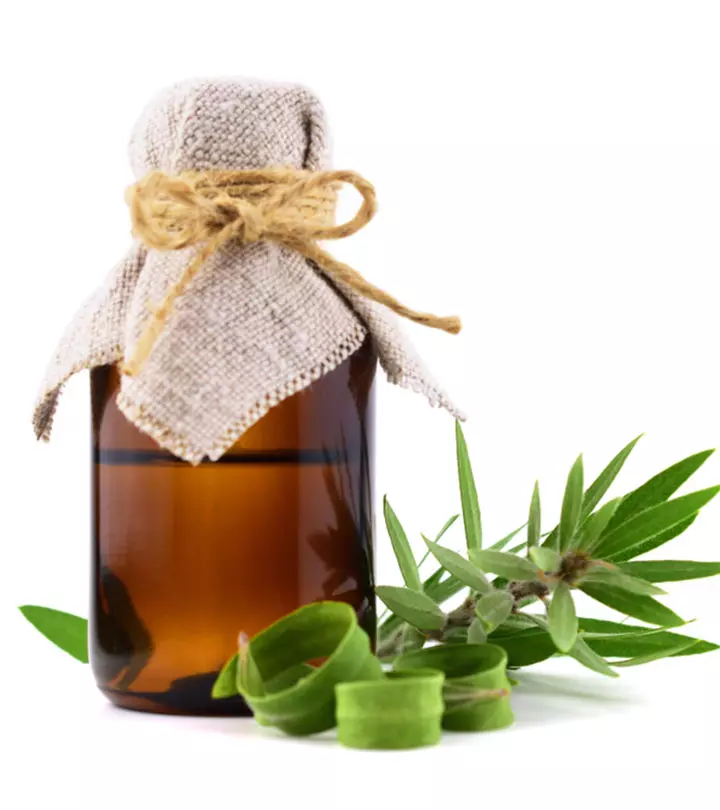



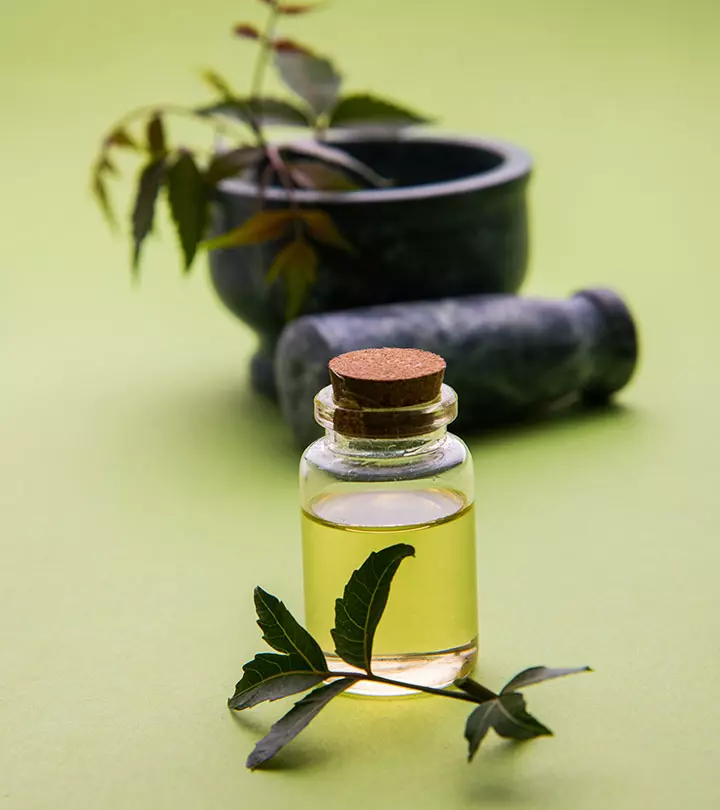
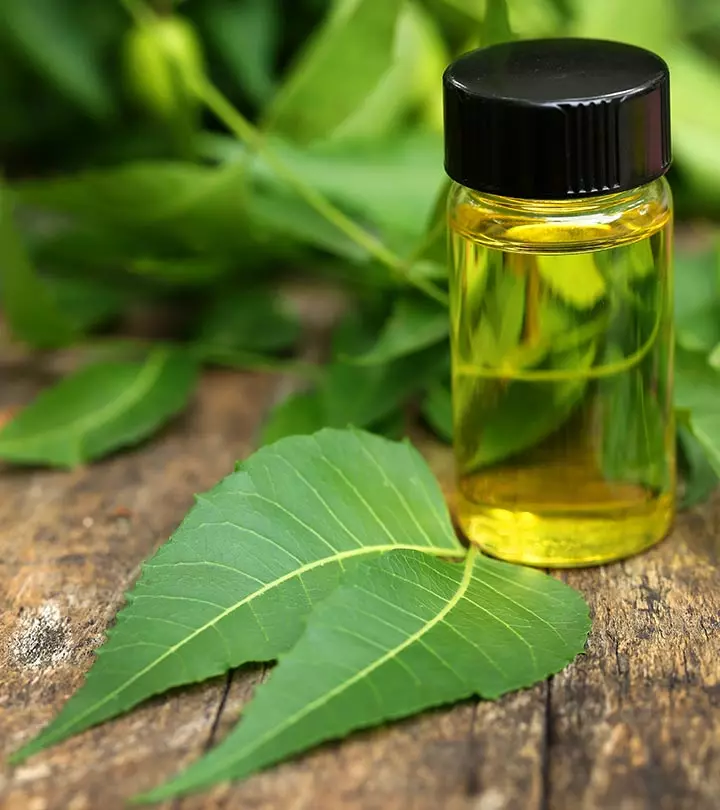

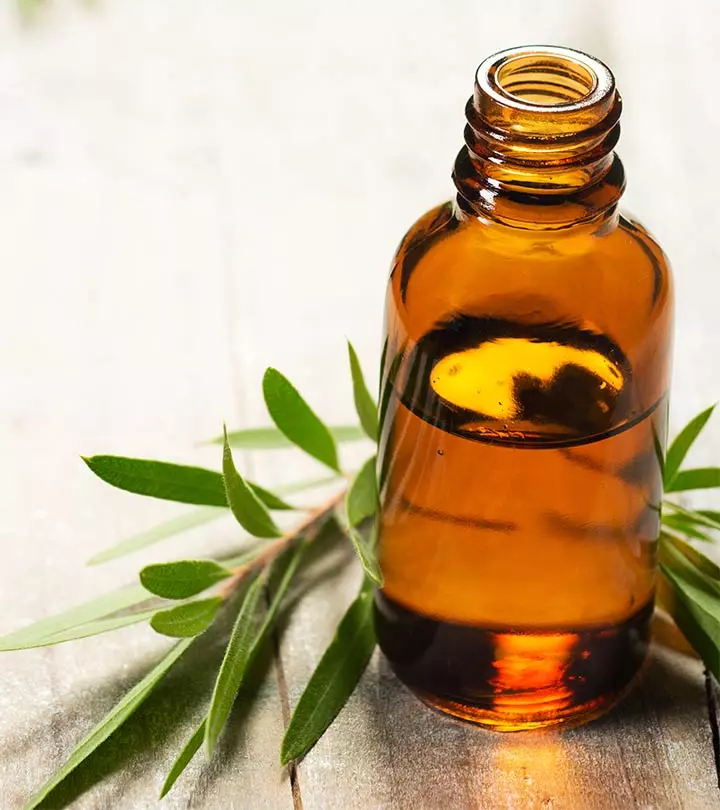












Community Experiences
Join the conversation and become a part of our empowering community! Share your stories, experiences, and insights to connect with other beauty, lifestyle, and health enthusiasts.